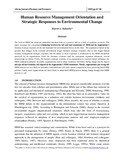| dc.description.abstract | The field of HRM has attracted substantial attention both as a practice and as a field of academic research. This paper examines the conceptual relationship between the soft and hard orientations of HRM and the organization’s business strategic response on the one hand and the environmental forces on the other. The argument is based on the premise that changes in the external environment trigger business strategic responses that in turn trigger human resource management strategic responses, but the nature of these responses is moderated by the HRM orientation practiced by an organization. From the literature evidence and the conceptual argument advanced, several propositions are drawn. Firstly, the business strategic response of an organization to external stimuli influences the HRM orientation adopted. Secondly, organizations tend to adopt workforce flexibility during change but the degree and type of that flexibility will depend on the organization’s HRM orientation. Thirdly, organizations practicing soft HRM policies are less likely to encounter confrontations with trade unions compared to those practicing hard HRM policies. Lastly, most organizations are more likely to adopt hard HRM practices during change though their HRM rhetoric is soft. | en |

